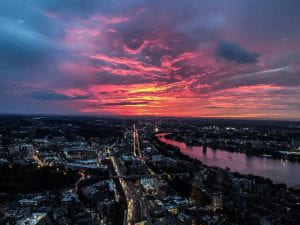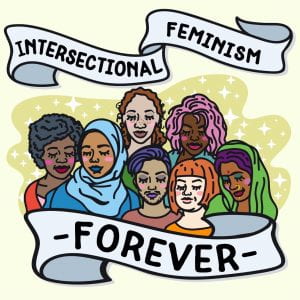“Connecting is being. Being is connecting. That’s what IS. Connecting describes the Universe. Connecting describes us. The experience of connecting is full alive-ness. Full alive-ness and wonder. The felt experience of connecting is the desire behind all desires. Not having it is the fear behind all fears.” – Harville Hendrix.
I heard this quote a few days ago from @queercosmos on instagram when he was describing this Mercury Retrograde in Pisces (shoutout to all my pisces out there!). This quote comes from a program called “Safe Conversations” facilitated by Dr. Harville Hendrix and his wife, Dr. Helen LaKelly Hunt. When I heard this, it immediately reminded me of this week’s topic of understanding place in terms of Eco Feminism and this idea of a “bedrock of democracy which Terry Tempest Williams speaks about. This idea of connection is crucial to our identity as a society and as individuals and also to being aware and conscious of how we treat the Earth, our home, as well as one another.
Now, I know what you’re thinking. This quote offers a lot to unpack on a Monday morning at 8am, or really, anytime of day… BUT: it is worth it. Before you click away and decide that you don’t have the brain power to dissect this, allow me!
“Connecting is being, and being is connecting. That’s what IS” – (not too hard, right?) As human beings, we need to feel connected to one another, to our environment, in order to feel psychologically okay. This is actually a scientific fact stated within Maslow’s Hierarchy of Needs:

Did you find it? The key word is “connection.” Connection is considered a basic human need which fulfills love and belonging.
At the end of the day, all we really want as people is to be loved, to be happy, and to feel connected. This idea pretty much sums up the entire quote. If you can grasp that idea (which I’m almost positive you do since you are a human being), you can understand this quote. Which leads me into the next major theme here – understanding place.
I grew up and currently live in New Bedford Massachusetts, about a 45 minute drive from Boston. I love Boston. I love it so much. Even though I was not born in Boston nor do I currently live there, I love Boston and everything it has to offer. I love the people, the hustle and bustle of the city, the sounds of the city and the people and the cars going by, I love the way the sun sets over all the skyscrapers and how pretty the water looks at dusk, how all the lights look at night… you get the gist. I truly believe that even if you live in the city, you can experience the bedrock of Democracy. Sure, it’s nice to live in the mountains / wilderness, if that’s your thing – but we simply cannot forget the city.
The point I’m trying to make is that Boston inspires me, & I even hope to move there one day. I feel as though Boston truly informs who I am and carries my soul’s history. I resonate with Boston and the constant, flowing, and almost electric energy I feel whenever I am there. We have the opportunity to truly improve where we live, whether it be Boston or the mountains of Colorado.
(image cre dit to reddit user u/chelsaeyr)
dit to reddit user u/chelsaeyr)
Williams says, “I choose to err on the side of preservation, and stand shoulder to shoulder with brothers and sisters… Each of us belongs to a particular landscape, one that informs who we are, a place that carries our history, our dreams… in each of these places, home work is required, a partici
pation in public life to make certain all is not destroyed… we cannot do it alone. This is the hope of a bedrock democracy, standing our ground in the places we love, together” (Williams 18-19). This sums up the whole point of taking care of the place we dwell in order to preserve and lift one another up. How can we expect to reap the benefits of where we are if we do not show that place respect and appreciation? This means not littering, people. We need to make sure that we are also respecting one another in this process, too. Because how can we get anywhere if everyone is just mean and miserable to each other?
I do agree with Kingsolver that we need wilderness, but not in the way that she seems to represent it. I feel like Kingsolver paints this picture of the ‘wilderness’ (which in her case, is a log cabin in a rural place in Southern Appalachia) as a type of all-knowing paradise in which she is a glowing goddess of nature and of femininity. If this is what makes her happy, great. I think it’s important for us to step away from our day to day lives and make time for travel so we can see other parts of the world, or the ‘wilderness.’ However, I believe that this type of peace, abundance, and appreciation can be felt and created anywhere you are in the world – and this comes from love, respect, and appreciation for our environment, each other, and ourselves.
Or should I say, connection.
Works Cited
Kingslover, Barbara., Knowing our Place
http://www.pbs.org/now/printable/transcript_smallwonder_print.html
Williams, Terry Tempest. Red: Passion and Patience in the Desert. Pantheon Books, 2002.
McLeod, Saul., Maslow’s Hierarchy of Needs
https://www.simplypsychology.org/maslow.html
Annotated Bibliography
This article written by Saul McLeod helped me to define certain aspects of Maslow’s Hierarchy of Needs, a theory of fundamental things that humans need in their lives in order to be psychologically, physically, and emotionally sound. I used this article to prove my point that humans need connection to themselves, and to their society and peers in order to thrive in life. This article goes into depth about Maslow’s Hierarchy of Needs and the different tiers as well as what makes up those tiers. Saul McLeod is a teaching assistant in the field of psychology as well as a published researcher for The University of Manchester, Division of Neuroscience & Experimental Psychology. McLeod holds a psychology degree as well as a masters degree in research.

